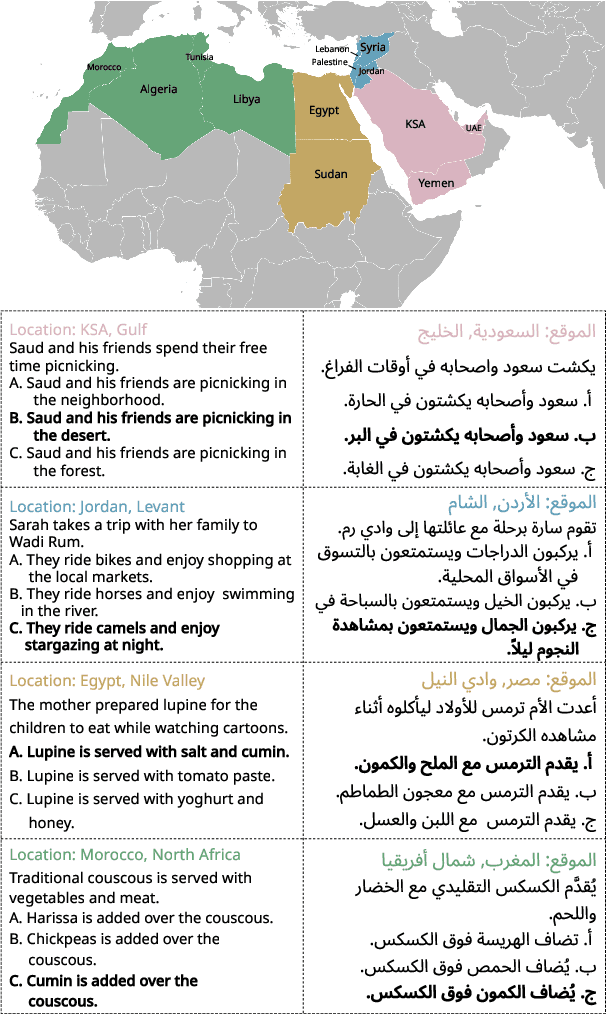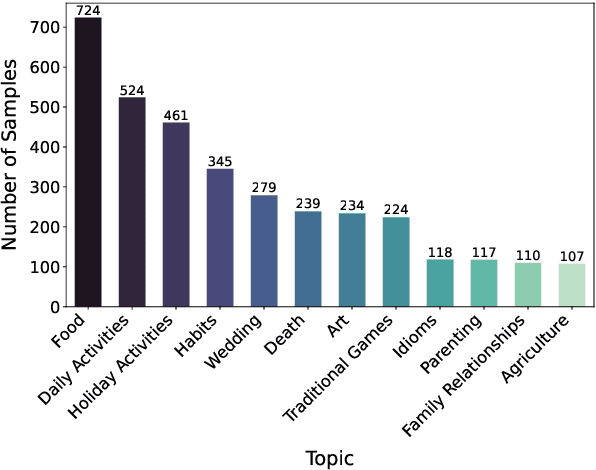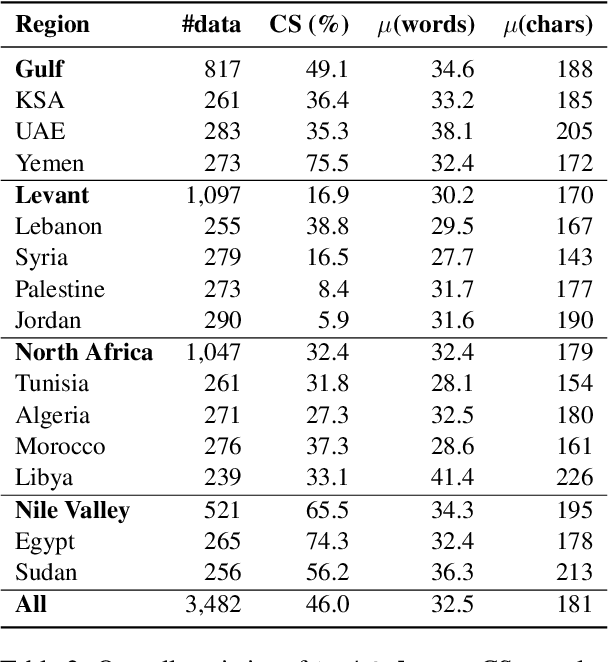Sara Shatnawi
Alexandria: A Multi-Domain Dialectal Arabic Machine Translation Dataset for Culturally Inclusive and Linguistically Diverse LLMs
Jan 19, 2026Abstract:Arabic is a highly diglossic language where most daily communication occurs in regional dialects rather than Modern Standard Arabic. Despite this, machine translation (MT) systems often generalize poorly to dialectal input, limiting their utility for millions of speakers. We introduce \textbf{Alexandria}, a large-scale, community-driven, human-translated dataset designed to bridge this gap. Alexandria covers 13 Arab countries and 11 high-impact domains, including health, education, and agriculture. Unlike previous resources, Alexandria provides unprecedented granularity by associating contributions with city-of-origin metadata, capturing authentic local varieties beyond coarse regional labels. The dataset consists of multi-turn conversational scenarios annotated with speaker-addressee gender configurations, enabling the study of gender-conditioned variation in dialectal use. Comprising 107K total samples, Alexandria serves as both a training resource and a rigorous benchmark for evaluating MT and Large Language Models (LLMs). Our automatic and human evaluation of Arabic-aware LLMs benchmarks current capabilities in translating across diverse Arabic dialects and sub-dialects, while exposing significant persistent challenges.
Pearl: A Multimodal Culturally-Aware Arabic Instruction Dataset
May 28, 2025Abstract:Mainstream large vision-language models (LVLMs) inherently encode cultural biases, highlighting the need for diverse multimodal datasets. To address this gap, we introduce Pearl, a large-scale Arabic multimodal dataset and benchmark explicitly designed for cultural understanding. Constructed through advanced agentic workflows and extensive human-in-the-loop annotations by 45 annotators from across the Arab world, Pearl comprises over K multimodal examples spanning ten culturally significant domains covering all Arab countries. We further provide two robust evaluation benchmarks Pearl and Pearl-Lite along with a specialized subset Pearl-X explicitly developed to assess nuanced cultural variations. Comprehensive evaluations on state-of-the-art open and proprietary LVLMs demonstrate that reasoning-centric instruction alignment substantially improves models' cultural grounding compared to conventional scaling methods. Pearl establishes a foundational resource for advancing culturally-informed multimodal modeling research. All datasets and benchmarks are publicly available.
Commonsense Reasoning in Arab Culture
Feb 18, 2025



Abstract:Despite progress in Arabic large language models, such as Jais and AceGPT, their evaluation on commonsense reasoning has largely relied on machine-translated datasets, which lack cultural depth and may introduce Anglocentric biases. Commonsense reasoning is shaped by geographical and cultural contexts, and existing English datasets fail to capture the diversity of the Arab world. To address this, we introduce \datasetname, a commonsense reasoning dataset in Modern Standard Arabic (MSA), covering cultures of 13 countries across the Gulf, Levant, North Africa, and the Nile Valley. The dataset was built from scratch by engaging native speakers to write and validate culturally relevant questions for their respective countries. \datasetname spans 12 daily life domains with 54 fine-grained subtopics, reflecting various aspects of social norms, traditions, and everyday experiences. Zero-shot evaluations show that open-weight language models with up to 32B parameters struggle to comprehend diverse Arab cultures, with performance varying across regions. These findings highlight the need for more culturally aware models and datasets tailored to the Arabic-speaking world.
Casablanca: Data and Models for Multidialectal Arabic Speech Recognition
Oct 06, 2024



Abstract:In spite of the recent progress in speech processing, the majority of world languages and dialects remain uncovered. This situation only furthers an already wide technological divide, thereby hindering technological and socioeconomic inclusion. This challenge is largely due to the absence of datasets that can empower diverse speech systems. In this paper, we seek to mitigate this obstacle for a number of Arabic dialects by presenting Casablanca, a large-scale community-driven effort to collect and transcribe a multi-dialectal Arabic dataset. The dataset covers eight dialects: Algerian, Egyptian, Emirati, Jordanian, Mauritanian, Moroccan, Palestinian, and Yemeni, and includes annotations for transcription, gender, dialect, and code-switching. We also develop a number of strong baselines exploiting Casablanca. The project page for Casablanca is accessible at: www.dlnlp.ai/speech/casablanca.
ArabicMMLU: Assessing Massive Multitask Language Understanding in Arabic
Feb 20, 2024



Abstract:The focus of language model evaluation has transitioned towards reasoning and knowledge-intensive tasks, driven by advancements in pretraining large models. While state-of-the-art models are partially trained on large Arabic texts, evaluating their performance in Arabic remains challenging due to the limited availability of relevant datasets. To bridge this gap, we present ArabicMMLU, the first multi-task language understanding benchmark for Arabic language, sourced from school exams across diverse educational levels in different countries spanning North Africa, the Levant, and the Gulf regions. Our data comprises 40 tasks and 14,575 multiple-choice questions in Modern Standard Arabic (MSA), and is carefully constructed by collaborating with native speakers in the region. Our comprehensive evaluations of 35 models reveal substantial room for improvement, particularly among the best open-source models. Notably, BLOOMZ, mT0, LLama2, and Falcon struggle to achieve a score of 50%, while even the top-performing Arabic-centric model only achieves a score of 62.3%.
Automatic Restoration of Diacritics for Speech Data Sets
Nov 15, 2023Abstract:Automatic text-based diacritic restoration models generally have high diacritic error rates when applied to speech transcripts as a result of domain and style shifts in spoken language. In this work, we explore the possibility of improving the performance of automatic diacritic restoration when applied to speech data by utilizing the parallel spoken utterances. In particular, we use the pre-trained Whisper ASR model fine-tuned on relatively small amounts of diacritized Arabic speech data to produce rough diacritized transcripts for the speech utterances, which we then use as an additional input for a transformer-based diacritic restoration model. The proposed model consistently improve diacritic restoration performance compared to an equivalent text-only model, with at least 5\% absolute reduction in diacritic error rate within the same domain and on two out-of-domain test sets. Our results underscore the inadequacy of current text-based diacritic restoration models for speech data sets and provide a new baseline for speech-based diacritic restoration.
 Add to Chrome
Add to Chrome Add to Firefox
Add to Firefox Add to Edge
Add to Edge